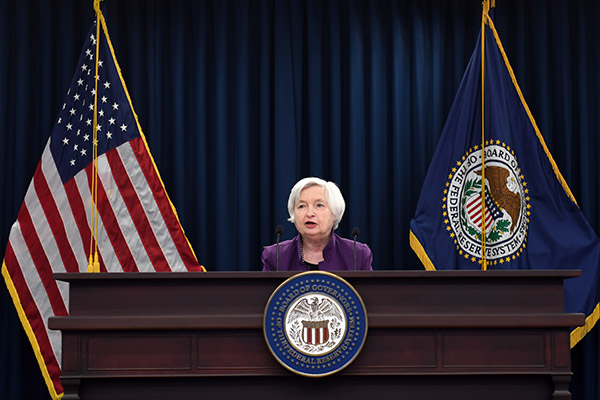
US Federal Reserve Chair Janet Yellen speaks during a news conference in Washington DC, June 14, 2017. (Photo/Xinhua)
The interest rate hike announced by the U.S. Federal Reserve on Wednesday has so far failed to produce a major ripple effect in emerging market economies. Policymakers in these countries, however, should continue to remain alert over the accumulative effects of future U.S. interest rate hikes and balance sheet cuts.
The Fed decided to raise the benchmark interest rates to a range of 1 percent to 1.25 percent on Wednesday and hinted at another rise later this year.
Although stock markets fell in the wake of the Fed's announcement, the falls were generally mild, reflecting that the decision had already been well priced in. China's benchmark Shanghai Composite Index even rose slightly on Thursday trading.
However, the hike, the third in seven months, together with the hint by Fed chair Janet Yellen that the Fed may begin cutting its holdings of bonds and other securities this year, has triggered market expectations that the Fed may speed up the pace of policy normalization, at a rate of three or four hikes a year through 2019.
If that happens, the changing interest rate gaps between the United States and other countries would inevitably lead to significant amounts of international capital flowing out of the developing and emerging market economies and into the U.S.. And the balance sheet cuts by the Fed, if carried out, would have repercussions for the global financial markets, reminiscent of the "taper tantrum" in 2013.
Therefore, the worst is yet to come for the world economy if the U.S. keeps the current tempo of financial policy tightening or even accelerates it.
Policymakers in other countries certainly can opt to follow suit to minimize the effect of the U.S. moves on their economy. But many face a dilemma since raising interest rates would jeopardize the corporate sector and cool their economy.
China faces the same problem. But reassuringly, Chinese policymakers acted early to tighten regulation of the financial sector to reduce financial risks and prevent any exigency.
So far, the Chinese economy remains sound, with its first-quarter GDP growth at 6.9 percent, laying a solid foundation for it to achieve its growth target of at least 6.5 percent this year. The May macroeconomic data also showed that industrial production and retail sales have increased steadily and job creation remains solid.
The stable trend of resilient growth means China will, in the worst-case scenario, be capable of combating financial turbulences triggered by abnormal global capital flows as a result of the U.S.' rate hikes and balance sheet cuts.


















































